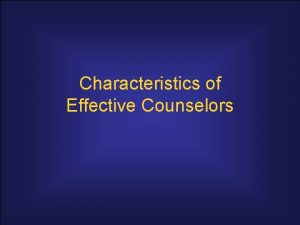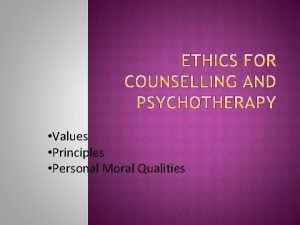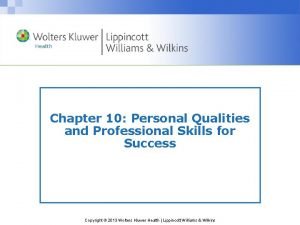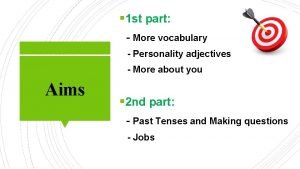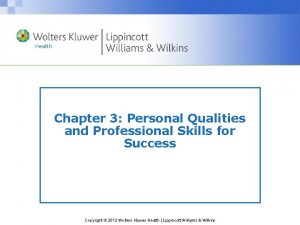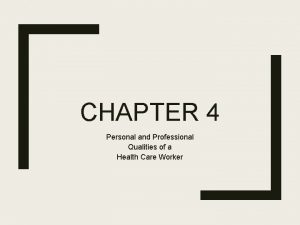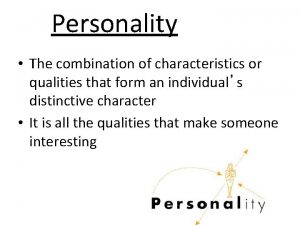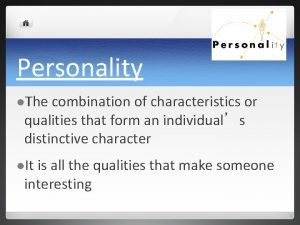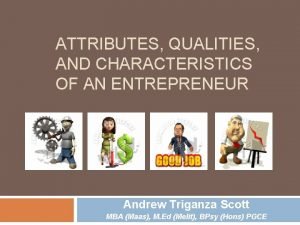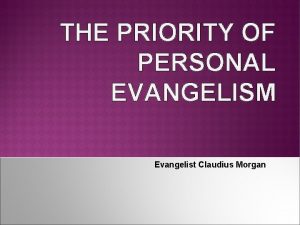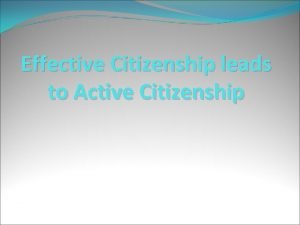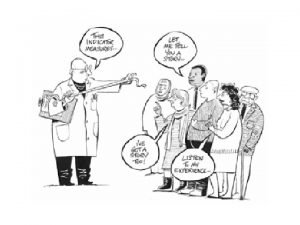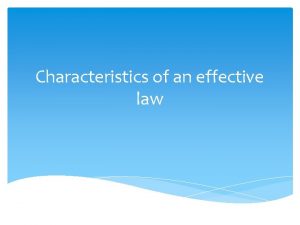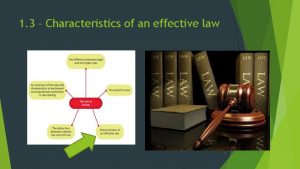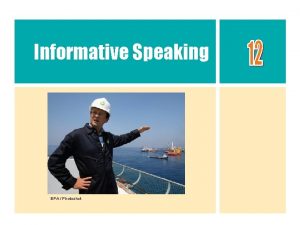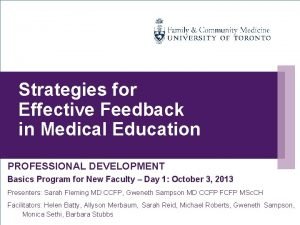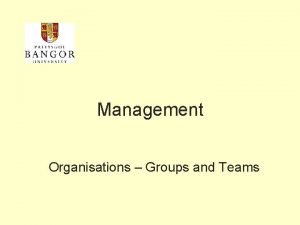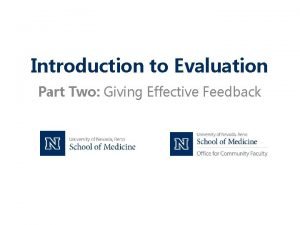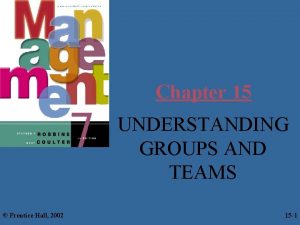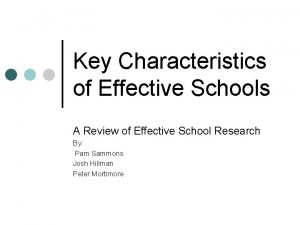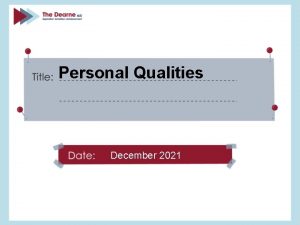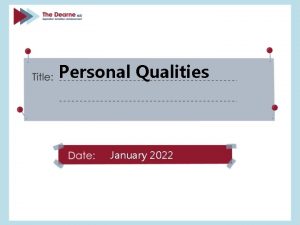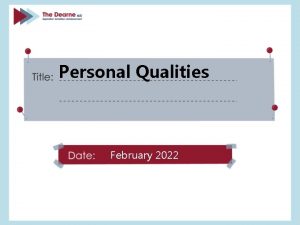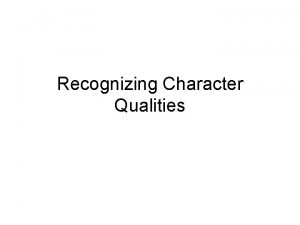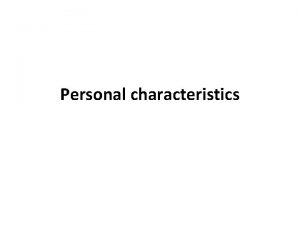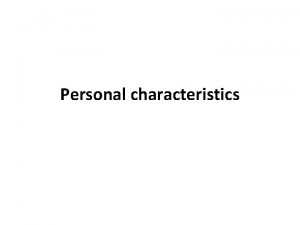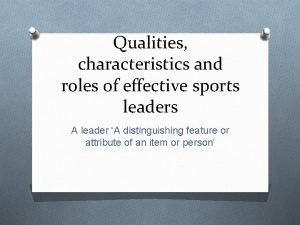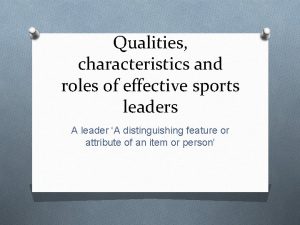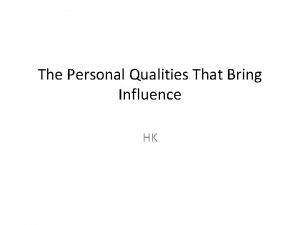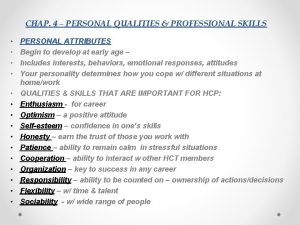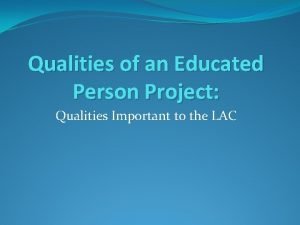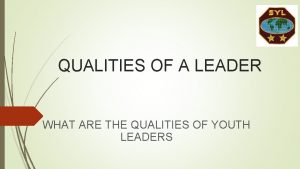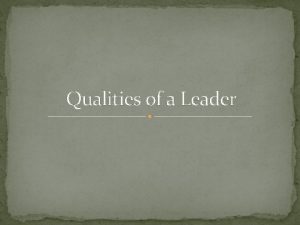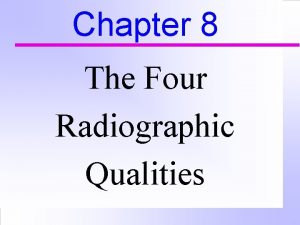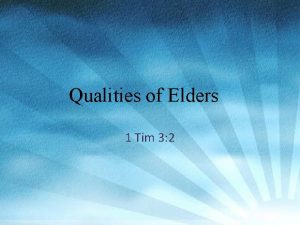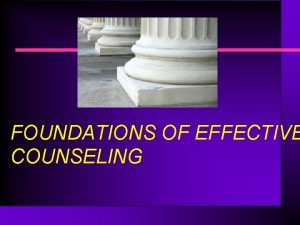Characteristics of Effective Counselors Counselors Personal Qualities 1


























- Slides: 26

Characteristics of Effective Counselors

Counselor’s Personal Qualities 1. Sincere interest in the welfare of others 2. Ability & willingness to be present in client’s joy or pain 3. Recognition & acceptance of one’s strength & vitality; no need to diminish others 4. Found one’s own counseling style. Cormier & Hackney, 1999, p. 7. Attributed to Corey, and Callanan (1998).

Counselor’s Personal Qualities 5. Willingness to be vulnerable & take risks 6. Self- respect, self-appreciation, strong sense of self-worth 7. Serve as models for clients 8. Risk mistakes & admit making them 9. Growth orientation 10. Sense of humor Cormier & Hackney, 1999, p. 7. Attributed to Corey, and Callanan (1998).

Counselor’s Interpersonal Skills • • • Pragmatism Competence Respect Genuineness Promotion of client empowerment & self -responsibility Cormier & Hackney, 1999, p. 7 -8. Attributed to Egan (1998, pp. 43 -55).

Effective Helpers • Self awareness • Psychological health • Sensitivity to racial, ethnic, & cultural factors • Open-mindedness Hackney & Cormier, 2001, pp. 13 -21. • • Objectivity Competence Trustworthiness Interpersonal attractiveness

Self-Awareness Of Your: • Need to – Give or nurture – Be liked, respected, loved; receive approval – Control, be critical, be right • Motivation for helping Hackney & Cormier, 2001, p. 14. • Feelings – – Happiness, satisfaction Hurt, disappointment Anger, sadness Fear, confusion • Personal strengths, limitations, & coping skills

Psychological Health • • Psychologically intact Free from over-whelming problems Recognize and manage personal issues Refer clients with problems like your own to other counselors • Seek services of a counselor for yourself, if necessary. Hackney & Cormier, 2001, pp. 14 -15.

Cultural Sensitivity Focused Culture-Specific Universal All cultures must be understood for their uniqueness. Broadens the definition of minority and argues for a subjective, more inclusive understanding of cultural impacts. Hackney & Cormier, 2001, p. 15.

Cultural Sensitivity • Focused culture-specific: too many variables confuse multiculturalism; render it meaningless. • Universal: culture must be defined by more than just racial or ethnic factors. – – – Gender, age, and physical disabilities Race, ethnicity Sexual orientation Socioeconomic level Religion and spiritual affiliation Hackney & Cormier, 2001, pp. 15. Cormier & Hackney, 1999, p. 8

Cultural Sensitivity • Integrative: – Focused culture-specific and the universal approach are both important – Both approaches are blended in “multicultural counseling and therapy” (Ivey, et al. , 1997). Hackney & Cormier, 1999, p. 15.

Cultural Competence • Be aware of your own cultural heritage. • Expand your range of experience. • Seek interaction opportunities with others different from yourself. • Be open to continuous learning about differing groups. Cormier & Hackney, 1999, pp. 8 -10. Attributed to Daw (1977).

Cultural Competence • Be honest about your range of experience. – Power – Privilege – Poverty – Oppression • Consider referring a client you cannot help from your own range of experience. Cormier & Hackney, 1999, pp. 8 -10. Attributed to Daw (1977).

Open-Mindedness • Freedom from fixed or preconceived ideas • Enlightenment • Internal knowledge – Perceptions, myths – Standards, values, judgments – Assumptions, biases • Knowledge of the world outside your own world Hackney & Cormier, 2001, p. 16.

Open-Mindedness Allows the counselor to: • Engage in honest communication. • Accommodate client’s – Feelings, – Attitudes, and – Behaviors. • Interact effectively with wide range of clients. Hackney & Cormier, 2001, p. 16.

Objectivity • Balance involvement with objective assessment. • Provide a new perspective to “reframe” the client’s issues(s). • Avoid dysfunctional communication patterns. • Recognize manipulation attempts by the client. Hackney & Cormier, 2001, pp. 16 -17.

Objectivity • Safeguards against countertransference: – Counterproductive emotional reaction; – Entanglement of the counselor’s needs in the client relationship; – The need to please one’s client; – Over-identification with client’s problem(s); – Romantic or sexual feelings toward a client; – Need to give constant advice; – Need to form friendships. Hackney & Cormier, 2001, pp. 16 -17.

Competence • Required to transmit and build confidence and hope with clients. • Needed to develop positive client expectations from the counseling experience. • Assures ability to work with wide variety of clients and client problems. • Includes multicultural competence as previously discussed. Hackney & Cormier, 2001, pp. 17 -18.

Competence • Egan (1998): The counselor is determined, by outcome of client results, to possess the necessary – information, – knowledge, and – skills. Hackney & Cormier, 2001, pp. 17 -18.

Competence • Kleinke (1994): Includes knowledge of – psychological processes, – assessment, – clinical skills, – technical skills, – judgment, – ethics and personal effectiveness. Hackney & Cormier, 2001, pp. 17 -18.

Competence • (Strong, 1968; Strong & Schmidt, 1970; Strong & Claiborn, 1982): Includes knowledge of – – – psychological processes, assessment, clinical skills, technical skills, judgment, ethics and personal effectiveness. Hackney & Cormier, 2001, pp. 17 -18.

Trustworthiness Do not promise more than you can do, and be sure you do exactly as you have promised. Hackney & Cormier, 2001, p. 16.

Trustworthiness • Hard to establish; easy to destroy • Includes – predictability, – reliability, – responsibility, – ethical standards. Hackney & Cormier, 2001, p. 16.

Trustworthiness • Safeguard clients’ communications. • Respond with energy to client concerns. • Essential to – Establish a base of influence, – Encourage clients’ self-disclosure. Hackney & Cormier, 2001, p. 16.

Trustworthiness The counselor cannot act trustworthy. The counselor must be trustworthy Hackney & Cormier, 2001, p. 16.

Interpersonal Attractiveness • Counselors appear “attractive” when they are seen as similar to or compatible with the client. • May be determined by instinct or selected dimensions: – Gender or age, – Demeanor or attitude, likeability and friendliness, – Worldview, theory, or approach. Hackney & Cormier, 2001, p. 18.

References • Cormier, Sherry & Harold Hackney. Counseling Strategies and Interventions, 5 th Edition. Allyn & Bacon, 1999. • Hackney, Harold L. & L. Sherilyn Cormier. The Professional Counselor: A Process Guide to Helping, 4 th Edition. Allyn & Bacon, 2001. • Sperry, Len, John Carlson, & Diane Kjos. Becoming An Effective Therapist. Allyn & Bacon, 2003.
 8 characteristics of effective helpers
8 characteristics of effective helpers Personal moral qualities
Personal moral qualities Chapter 4 personal and professional qualities
Chapter 4 personal and professional qualities Personal qualities and skills
Personal qualities and skills Personal qualities vocabulary
Personal qualities vocabulary Unit 3 personal qualities of a healthcare worker
Unit 3 personal qualities of a healthcare worker Chapter 4 personal and professional qualities
Chapter 4 personal and professional qualities Personal qualities of a care worker
Personal qualities of a care worker Professionalism examples
Professionalism examples Personal qualities and skills
Personal qualities and skills Personality is combination of
Personality is combination of The combination of characteristics
The combination of characteristics 5 characteristics of an entrepreneur
5 characteristics of an entrepreneur Evangelist morgan dead
Evangelist morgan dead Bristol characteristics of effective learning
Bristol characteristics of effective learning Characteristics of effective citizenship
Characteristics of effective citizenship Characteristics of good interview
Characteristics of good interview Five characteristics of an effective law
Five characteristics of an effective law 5 characteristics of an effective law
5 characteristics of an effective law Characteristics of effective informative speaking
Characteristics of effective informative speaking Characteristics of effective classroom rules
Characteristics of effective classroom rules Corbs feedback examples
Corbs feedback examples Characteristics of effective teams
Characteristics of effective teams Characteristics of effective feedback
Characteristics of effective feedback Characteristics of effective teams
Characteristics of effective teams Alternative assessment definition
Alternative assessment definition 7 characteristics of effective schools
7 characteristics of effective schools
